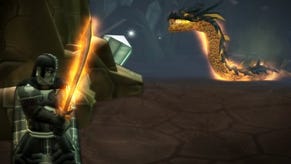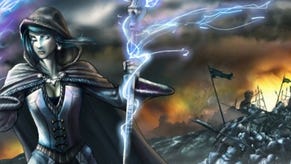Impressions: Elemental – Fallen Enchantress Beta
"doing a boyband squat"
It wouldn’t be fair to look at Fallen Enchantress as simply an apology for a broken game, even though it is fulfilling that role to an extent after War of Magic collapsed onto hard drives around the world. Oops, said Stardock, if you bought that, have the next one on us (although it's still possible to buy War of Magic for $39.95) . However, they also hired Derek “Fall From Heaven” Paxton, so this is as much what he did next as what happened to Elemental next. I’ve been poking at the beta.
You wait ages for a turn-based fantasy-themed strategy game to come along and then you miss the bloody bus you were supposed to catch because you haven’t got around to putting your pants on yet because it’s vitally important that you take just one more turn, and then just one more turn after that, and, seriously, forget it, I don’t even know where the bus is going anyway and all my pants are at least as far away as the other side of the room, and there’s an ogre eating my livestock.
I’ve been playing Elemental and another superficially similar game this year. Warlock was really all about those first there letters. WAR, it bellowed, spittly spells flying out of its mouth. There were settlements to build and new magicks to learn, but if the game ever caught you trying to do something that wasn’t warlike, it’d throw a tree at you and then the tree would punch you. Either that or spiders and bears would just eat all of your cities.
Elemental isn’t like that. There is war, although it feels particularly skirmishy rather than world-rending, but there are heaps of other things piled on top of the war. The war is like that David Foster Wallace book you keep meaning to pick up again, but it’s always buried under a heap of clothes, boardgames, magazines and paperwork.
You’ll get to the war and it’s little tactical grids of fireball-flinging fancy, but it might take you a couple of hours just to start a new game. Is a couple of hours an exaggeration? Maybe, but designing a faction and a leader doesn’t just involve choosing which element you want your wizardly warrior to emit from his nostrils whenever he/she sneezes, you can also pick a race, some strengths and weaknesses, and the colour of almost everything from nostril hair to socks and underwear. Oh, and a pose.
Would you follow this man into battle?
That’s not the pose I went with eventually. I don’t think my eventual choice has any impact on how other factions deal with me, although maybe everything in the world – animal, mineral or vegetable - doesn’t immediately attempt to end the existence of people who aren’t quite so gothtastic. I don’t know. I’m too busy doing a boyband squat while gripping a golden hammer.
This is the pose I went with eventually.
Enough dress-up for one day. Now, on to the infinite jest that is turn-based strategy and conflict, and to the bewildering world of Elemental. Imagine Warlock, the neat, tidy spellbiff game, and then imagine that somebody thought there wasn’t quite enough depth, breadth, length or girth to it. Now it’s been pumped full of all sorts of different things, all sorts of choices and random events, all sorts of spells and monsters. It’s as if everything that might be fitting has been stirred into the pot and then a few other things have kind of fallen off the shelf and ended up in the pot as well.
Too many cooks? Doubtful. Even though there’s a huge amount to dabble with and more being added incredibly frequently, Fallen Enchantress is rarely incoherent, although it is occasionally a tad overwhelming. It’s more a case of too many ingredients, perhaps, than too many cooks, but as long as they’re all adding to the sorcerous seasoning that should benefit the whole rather than diminishing it. At the moment, despite the existence of decent tutorials for just about everything, some aspects of the game feel much more necessary, much more designed, than others.
Let’s take that super sovereign I created. He could star in an RPG, he could, with the number of quests he gathers as he gads about the blighted countryside. Fetching things for folk, killing things for other folk, and collecting trinkets, armour and weapons as he goes, he’s not just an avatar for the kingdom/empire, he’s a little fellow just like all the other champions he meets and can hire. Depending on his individual qualities and race, he might not be able to use certain types of equipment, just like in an RPG(!), so he can trade with other members of his party.
The spells that he casts come in two varieties, strategic level and tactical level. The latter are used in combat to kill or weaken enemy troops, or to heal or buff his own troops. Because of his mastery of magic, he’s like a walking arsenal of destruction, very handy to have in the thick of it. In fact, problematically, the sovereign can become overpowered, dominant to the extent that armies are barely important at all. His/her strategic spells can also affect living things, but I find myself using them more often on my cities, making them more productive. See, along with all those RPG bits, there’s city management to keep an eye on as well, and as is Fallen Enchantress’ way, it has its own complexities and oddities.
A settlement only gathers resources from the tile that it’s on, even though it has an influence box around it, as is always the case when settlements are built in an isometric world. To benefit from other tiles, a building must be placed on them. Simple. Some buildings will cause the influence zone to expand faster but if a resource is outside that zone, a pioneer unit can be trained and sent to build an outpost, allowing that resource to be harvested even if there is no settlement nearby, which makes the zones less prescriptive and simple than they often are in games of this sort.
Then there’s specialisation. When a settlement grows it must choose whether it will be a town, fortress or conclave, each with specific advanced buildings available to it. It’s another tweak to an expected formula, another way to add an extra layer to an expected measure of progress. Settlements have an ‘essence’ rating alongside production. Essence limits how many spells they can have buffing them at any one time. Another detail, another thing to keep an eye on.
The whole game seems to work at that level, which is to say on multiple levels. Things seem to work as anyone familiar with the genre would expect, and sure enough they do, but there’s usually at least one detail, one further option, to take into account. Units can be trained, for instance, but they can also be customised, though not quite to the level of a sovereign.
Having all of this fantastical stuff to play with is great, or at least kind of great, or at least it should be great. I find myself complaining that games aren’t overflowing with kitchen sinks, a recent example being FTL, which, while I’ve been enjoying it very much, doesn’t have enough encounters and flavour text to suck me back in every day. Borderlands 2 is at the opposite extreme – a constant barrage of bullets, guns and braying, most of which I happily ignore, writing it off as inconsequential noise.
I can’t do that in a strategy game though, not without being haunted by the feeling that I’m missing something important, or that not everything is as balanced as it should be. When a campaign runs long, there’s often a lack of activities left in the world, as if all those exciting goodies are swept up too early, so the seeming abundance of ruins and heroes fades by the mid-game.
Fallen Enchantress does so much but, even with this late beta, the entirety doesn’t quite form a whole and the experience feels somehow less than the sum of its parts. I’ll cover all of the systems in more detail after release, but at the moment, much as it has improved over the months, and detailed and intriguing as it is, I don’t feel comfortable calling how this Elemental will shape up. The oddest aspect is that I find all of the RPG elements more memorable than the strategic elements, so that despite all the options, the business of governing feels somewhat hollow.










